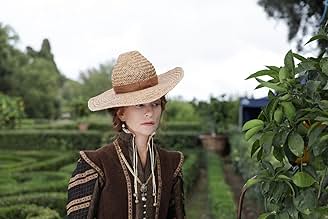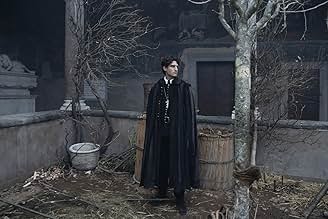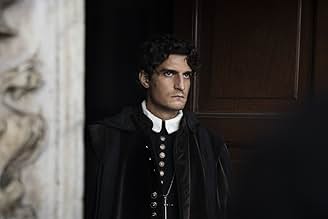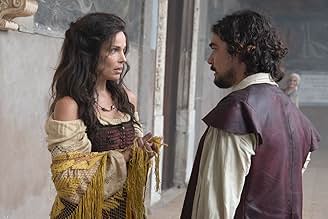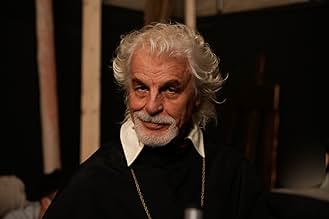L'ombra di Caravaggio
- 2022
- 2 घं
IMDb रेटिंग
6.5/10
1.9 हज़ार
आपकी रेटिंग
अपनी भाषा में प्लॉट जोड़ेंThe Catholic Church secretly investigates Caravaggio as the Pope weighs whether to grant him clemency for killing a rival.The Catholic Church secretly investigates Caravaggio as the Pope weighs whether to grant him clemency for killing a rival.The Catholic Church secretly investigates Caravaggio as the Pope weighs whether to grant him clemency for killing a rival.
- निर्देशक
- लेखक
- स्टार
- पुरस्कार
- 13 जीत और कुल 6 नामांकन
फ़ीचर्ड समीक्षाएं
I saw it as a fair work. For beautiful cinematography, reminding, scene bty scene, the art of Michelangelo Merisi, for Riccardo Scamarcio and his work in skin of Caravaggio, for Isabelle Huppert and Louis Garel, more than inspired crafters of their characters , for music and for good kick to viewer to (re)discover a great artist masterpieces.
Obvious, the film reflects the perspective of Michele Placcido and, I admitt, far to be easy say about the best manner to reflect a life defined by torments, force and shadows like this.
A beautiful film, not perfect, not correct in many details, not exactly for admirers of Caravaggio, simplistic for few reasons but enough for define it more than decent movie , not comparing with Derek Jarman 1986 film or with documentaries across last decades.
Obvious, the film reflects the perspective of Michele Placcido and, I admitt, far to be easy say about the best manner to reflect a life defined by torments, force and shadows like this.
A beautiful film, not perfect, not correct in many details, not exactly for admirers of Caravaggio, simplistic for few reasons but enough for define it more than decent movie , not comparing with Derek Jarman 1986 film or with documentaries across last decades.
L'Ombra di Caravaggio promises a fiery portrait of a tortured genius and instead delivers two hours of overwrought mood lighting, erratic time jumps, and enough theatrical whispering to power an entire semester at drama school.
The film adopts the now-inescapable "non-linear" structure, which in this case means the plot zigzags like a drunk fencing master. Sure they toss in a few time markers, but stylistically it's all one long, indistinguishable swirl of tormented men in cloaks.
Our anti-hero Caravaggio is painted (pardon the pun) as your typical Renaissance bad boy: rebellious, tortured, bisexual, brooding, but also - plot twist! - a devout Catholic. Because nothing screams "believable complexity" like orgies one minute and confessions the next. He's supposed to feel radical, but ends up as a kind of art-school Jesus with eyeliner.
Enter "Ombra," the Church's enforcer and a villain so laughably named it's amazing no one bursts out laughing when he introduces himself. Shadow, really? Why not just call him "Father Oppression" and be done with it? He spends most of the film lurking in corners and embodying the Vatican's greatest hits: repression, judgment, and fabulous robes.
As far as the orgies are concerned, we didn't need quite so many scenes of candlelit debauchery, complete with bored courtesans, snarling pigs, and pouting boys.
To pad things out between the sex and the brooding, the film indulges in lavish re-creations of Caravaggio's paintings, which are admittedly striking - if you enjoy watching actors pose like a diorama in a museum gift shop. At times, it feels less like a biopic and more like an over-budgeted PowerPoint presentation on Baroque composition.
And then there's the ending. Since history has left Caravaggio's death ambiguous, the filmmakers go full fan-fiction and cook up a finale that manages to be both absurd and deeply unsatisfying. One almost expects him to ascend into a ray of divine light, paintbrush in hand.
On the plus side the lighting is gorgeous. Every scene looks like it's been lit by angels and Instagram filters. But beautiful visuals can only carry you so far when the script feels like a Gregorian soap opera.
The film adopts the now-inescapable "non-linear" structure, which in this case means the plot zigzags like a drunk fencing master. Sure they toss in a few time markers, but stylistically it's all one long, indistinguishable swirl of tormented men in cloaks.
Our anti-hero Caravaggio is painted (pardon the pun) as your typical Renaissance bad boy: rebellious, tortured, bisexual, brooding, but also - plot twist! - a devout Catholic. Because nothing screams "believable complexity" like orgies one minute and confessions the next. He's supposed to feel radical, but ends up as a kind of art-school Jesus with eyeliner.
Enter "Ombra," the Church's enforcer and a villain so laughably named it's amazing no one bursts out laughing when he introduces himself. Shadow, really? Why not just call him "Father Oppression" and be done with it? He spends most of the film lurking in corners and embodying the Vatican's greatest hits: repression, judgment, and fabulous robes.
As far as the orgies are concerned, we didn't need quite so many scenes of candlelit debauchery, complete with bored courtesans, snarling pigs, and pouting boys.
To pad things out between the sex and the brooding, the film indulges in lavish re-creations of Caravaggio's paintings, which are admittedly striking - if you enjoy watching actors pose like a diorama in a museum gift shop. At times, it feels less like a biopic and more like an over-budgeted PowerPoint presentation on Baroque composition.
And then there's the ending. Since history has left Caravaggio's death ambiguous, the filmmakers go full fan-fiction and cook up a finale that manages to be both absurd and deeply unsatisfying. One almost expects him to ascend into a ray of divine light, paintbrush in hand.
On the plus side the lighting is gorgeous. Every scene looks like it's been lit by angels and Instagram filters. But beautiful visuals can only carry you so far when the script feels like a Gregorian soap opera.
The hypocrisy of key Church figures who condemn the sensuality of the painter, all the while competing to hoard his art seems bizarre, the figure of Caravaggio becomes an attractive and sympathetic revolutionary hero in a secular era. While his animalistic rutting grosses me out he gets the best lines. The investigator who travels around interviewing witnesses is so intent on his task he becomes one-dimensional. But the film suffers from such poor narrative construction that it becomes tedious and repetitive, gradually dulling my interest. If the powerful originality of the artist's output were shown more clearly I would have found it more enjoyable.
The movie is the story of Michelangelo Merisi da Caravaggio who was an Italian painter in the 16th century, through the eyes of the Pope's investigator. He was known for painting "what he saw", some kind of reality that he wanted close to the divine, which was of course not ok with the Catholic Church. Within his paintings, you could see famous prostitutes, hoboes, represented as saints, such as Mary or St Peter. His life has multiple legends around it, he was known to have sexual relationships with both males and females, while painting for the Church, and his competitors tried to destroy him for that. He had to flee Rome after killing (accidentally?) someone and lived in Naples, Sicily, Malta, etc. The story of the movie is a bit long, but this is not why you should see this movie. The whole movie is staged as a painting, with that kind of atmosphere that you get from 16th century Italian paintings. Would I watch it again? No, but I am happy I watched it.
I just thought that this movie about such big artist would have more art in it. The process and the hard work. Instead, all I got was already finished paintings and an italian telenovela with more dialogue than Nolan's Oppenheimer, with no time to absorb the beauty of the cinematography and the poetic essence of Caravaggio's life and his work.
But I thought using Schatten's perspective of interviewing Caravaggio's models and other people he met and capturing their narratives and stories so the viewer can learn more about the artist was smart and the story came nicely full circle at the end. But that still doesn't compensate the rest for me.
Riccardo Scamarcio has a nice butt tho.
But I thought using Schatten's perspective of interviewing Caravaggio's models and other people he met and capturing their narratives and stories so the viewer can learn more about the artist was smart and the story came nicely full circle at the end. But that still doesn't compensate the rest for me.
Riccardo Scamarcio has a nice butt tho.
क्या आपको पता है
- ट्रिवियाRiccardo Scamarcio said about Caravaggio's character: "I immediately thought that [Caravaggio] was like Elvis Presley. My reference was Elvis. A small-town boy with great energy, passion, talent and rigor towards art. At that time, painting was the mainstream, there was nothing else, there was no photography, there was no radio, television or cinema. Paintings were so powerful because they spoke directly to the unconscious. And this man was the first to represent sacred images in a completely different way."
- गूफ़सभी एंट्री में स्पॉइलर हैं
टॉप पसंद
रेटिंग देने के लिए साइन-इन करें और वैयक्तिकृत सुझावों के लिए वॉचलिस्ट करें
- How long is Caravaggio's Shadow?Alexa द्वारा संचालित
विवरण
बॉक्स ऑफ़िस
- बजट
- €1,22,61,966(अनुमानित)
- दुनिया भर में सकल
- $48,95,695
- चलने की अवधि2 घंटे
- रंग
- पक्ष अनुपात
- 2.39 : 1
इस पेज में योगदान दें
किसी बदलाव का सुझाव दें या अनुपलब्ध कॉन्टेंट जोड़ें

